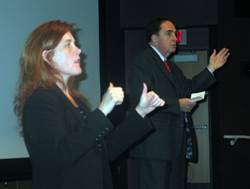 |
Sign language interpreter Jamy Elker echoes the words of UNMC Chancellor Harold M. Maurer, M.D., during one of last week’s employee forums. |
More than 250 people attended the two Employee Forums last week in the Durham Research Center Auditorium.
UNMC Chancellor Harold M. Maurer, M.D., outlined the university’s request for additional state funds to help raise salaries to the midpoint of peers. The Legislature’s Appropriations Committee is currently recommending a 2.1 percent budget appropriation, which falls below the university’s desire to fund a 4.4 percent salary increase for faculty and staff.
Unable to reach agreement with collective bargaining units at the University of Nebraska at Omaha and the University of Nebraska at Kearney, a special master has ordered the university system to pay salary increases of 4.3 and 4.4 percent each year.
“This is a nine-inning game and we’re in the top of the sixth inning,” Dr. Maurer said of the legislative process. ‘It’s a dance we go through every year, but this year is particularly difficult since the governor wants to return dollars to the citizenry. That’s OK, but not at the expense of education.”
|
|
“Nonessential does not mean not important,” Houpt emphasized. “This has nothing to do with a position’s value to the university, but how it relates to the catastrophe.”
Last summer, departments were asked to identify positions as essential or nonessential based on such catastrophic events as a biological/chemical/radiological event, fire, ice/snow, pandemic, severe weather, terrorism or water damage.
The identifying information now has been loaded into the new Essential Positions section in Jobs@, Houpt said.
Essential positions also are classified as “campus essential,” meaning they affect the campus as a whole, such as security; and department essential, meaning they are essential to a particular department.
In the event of an emergency or catastrophe, nonessential employees may be asked to stay home for their own safety or to fill positions as needed, Houpt said.
During the forums, John Russell, director of Human Resources, also updated employees on recent changes in university leave policies.
Under the changes, the maximum vacation balance for all university employees was increased to 280 hours effective April 1. The balancing for April occurs on April 30, Russell said, so employees actually have until May 1 to get their balance under 280 in order to continue to accumulate leave.
Once an employee has accumulated 280 hours of unused vacation, they shall not earn or receive additional vacation accruals until their accumulated and unused vacation is less than 280 hours.
Under the previous university vacation policy, the number of vacation leave hours that could be carried over from one calendar year to the next was limited to the number of hours earned by the employee that calendar year. At the end of the year, any accrued vacation hours above that amount were “lost.” The previous maximum annual vacation leave accrual amounts were 200 hours for Office/Service Staff and 192 hours for Academic/Administrative and Managerial/Professional Staff.
The policy revision is in response to a Nebraska Supreme Court ruling last year in the Roseland vs. Strategic Staff Management case.
Under the new policy, Russell said employees who possess more than 280 hours of accrued but unused vacation may wish to schedule vacation leave during March and April and thereafter in order to continue to accrue additional vacation.
Employees who have accumulated more than 280 hours of vacation leave as of April 30 will be entitled to retain such excess vacation leave of more than 280 hours for future use but they will not continue to accrue more leave until their balance drops below 280 hours.
The policy revisions also modify the sick leave policy for Office/Service Staff.
Under the previous policy, Office/Service Staff could accumulate above the maximum limit of 1,440 hours, with the balance being adjusted back to 1,440 at the end of each calendar year. The new policy caps sick leave accumulation at 1,440 hours (180 days) in order to remain in compliance with the law. Office/Service Staff who retire will continue to receive a supplemental salary payment equal to one-fourth of their accumulated sick leave up to a maximum of 360 hours under the revised policy.
Leave balances are displayed at the bottom of the pay advice and are also available in SAP ESS. Employees can access the SAP ESS Web site at http://ess.nebraska.edu/ess/index.shtml.